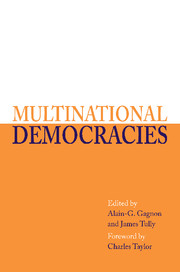Book contents
- Frontmatter
- Contents
- Notes on the contributors
- Foreword by Charles Taylor
- Acknowledgements
- Introduction
- Part I Justice and stability in multinational democracies
- 1 So many nations, so few states: territory and nationalism in the global era
- 2 Political stability in multinational democracies: comparing language dynamics in Brussels, Montreal and Barcelona
- 3 Justice and stability in multinational societies
- 4 Political liberalism in multinational states: the legitimacy of plural and asymmetrical federalism
- Part II Struggles over recognition and institutions of accommodation
- Part III Modes of reconciliation and conflict management
- References
- Index
4 - Political liberalism in multinational states: the legitimacy of plural and asymmetrical federalism
Published online by Cambridge University Press: 06 October 2009
- Frontmatter
- Contents
- Notes on the contributors
- Foreword by Charles Taylor
- Acknowledgements
- Introduction
- Part I Justice and stability in multinational democracies
- 1 So many nations, so few states: territory and nationalism in the global era
- 2 Political stability in multinational democracies: comparing language dynamics in Brussels, Montreal and Barcelona
- 3 Justice and stability in multinational societies
- 4 Political liberalism in multinational states: the legitimacy of plural and asymmetrical federalism
- Part II Struggles over recognition and institutions of accommodation
- Part III Modes of reconciliation and conflict management
- References
- Index
Summary
This chapter deals with normative and institutional concerns about the legitimacy and suitability of establishing asymmetrical agreements in multinational societies. In it, I will defend the notion of asymmetrical plural federalism for both the recognition of identities it engenders and the possibilities for self-government of national federal units it affords. After a brief discussion of political liberalism and federalism in cultural pluralist contexts (section 1), I put forward an application of plural federalism for the Spanish estado de las autonomías taking into account its membership of the European Union (section 2).
Two initial comments on multinational states and federalism
Political liberalism and cultural pluralism
The recent debate between political liberalism and cultural pluralism is helping to achieve two things: (1) a better understanding of the cultural limitations of the liberal tradition, both in normative theory and in the institutional practices of democracies, including federalism; and (2) the fuller realization of those very same ‘universal’ values of democratic liberalism, without the cultural and ideological biases of yesteryear.
The first aspect highlights and corrects the tendency of the liberaldemocratic tradition to treat cultural differences as particularist trends or deviations. Like other political theories, political liberalism starts from a specific set of questions, concepts and values which are only laterally relevant when dealing with cultural phenomena of a plural nature, such as political accommodation in multinational states. Hence cultural questions related to identity cannot be made to fit the usual liberal-democratic approaches to individual political rights, pluralism, liberty and equality.
- Type
- Chapter
- Information
- Multinational Democracies , pp. 110 - 132Publisher: Cambridge University PressPrint publication year: 2001
- 7
- Cited by

